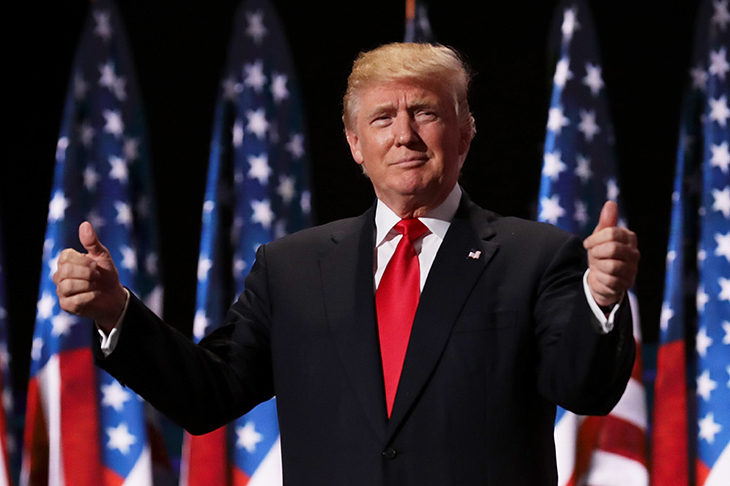The day after Britain voted to leave the European Union, Donald Trump arrived by helicopter at Turnberry, his golf course in Scotland. The financial markets were in crisis and David Cameron had resigned in a panic. The Dutch Prime Minister, Mark Rutte, said that Britain had ‘collapsed: politically, monetarily, constitutionally and economically’. The then candidate (still not even party nominee) Trump put it differently. ‘You just have to embrace it,’ he said. ‘It’s the will of the people. I love to see people take their countries back.’ Perhaps his advice should have been taken more seriously.
Huge numbers of people, including many Americans, think that Trump is unfit for the office of president. But why do so many support him? In most advanced democracies, there is a desire for change, which is why political insurgents — from Trump to Nigel Farage to Emmanuel Macron — can come from nowhere to finish first.
Trump was chosen by Americans precisely because he threatened the status quo. British politicians can learn from that. He returns to Britain next week. He may not be well loved here, but he should be welcomed as the elected representative of a country that is seeking to offer its help and support — at a time when Britain is in dire need of allies.
President Trump has been nothing like the disaster so many anticipated. The American economy has enjoyed tremendous growth under his leadership: unemployment is at 3.6 per cent, the lowest in five decades. Wages are starting to creep up, too: average hourly earnings increased by 3.2 per cent in the past year. Any European leader would kill for such figures. Trump has reaped the benefits of a recovery well under way under President Obama, but he has pursued a pro-growth, deregulatory strategy. America is thriving as a result.
In foreign policy, too, Trump’s tactics have had more strategy and direction than his critics allow. If he can resist the temptation to bomb Iran, he could complete his first term without starting a war. Given the foreign policy misadventures of his predecessors, that would be a major achievement. His tariff threats spook the markets, especially when it comes to his on-off trade war with China. As he has shown with his recent deals with Canada and Mexico, however, his end goal is more free trade on fairer terms. By the time the G20 meets in a few weeks, it is possible a US-China deal might have been achieved, lowering tariffs in a way that benefits everyone.
Trump is widely expected to make a spectacular gaffe during his visit next week, to breach some important protocol or say something untoward. He probably will, or at least he’s bound to make some minor faux pas that will be deemed a grave insult. Last year he was fiercely criticised for standing in the way of the Queen as she showed him the Coldstream Guards. But as Robert Hardman points out in this weeks issue, Her Majesty has had to suffer far greater indignities in the name of diplomacy. Nicolae Ceausescu, Robert Mugabe and Mohammad bin Salman have all enjoyed royal welcomes at Buckingham Palace.
Trump is the leader of our largest and most powerful ally. His administration is eager to offer Britain a free trade deal. Trump once said that Brexit Britain should be ‘at the front of the queue’, while Barack Obama threatened to leave Britain ‘at the back of the queue’. Can anyone doubt that Trump’s proposal is better for Britain? Given that the US is Britain’s biggest export market (by some margin) this is an offer that should be seized with both hands. Under Theresa May, it wasn’t.
In the first weeks of his administration, Trump made overtures towards the UK about the ‘beautiful’ bilateral trade deal he wanted to strike. May feared that this would cause legal difficulties with the European Union. Her timidity was a great mistake. No sane analyst believes that America could instantly replace the European Union as a trading partner, but that doesn’t mean the offer of a new free trade agreement should be ignored. At the very least, May could have used the possibility of a deal as ‘leverage’ — to use one of the President’s favourite terms — in her dealings with Brussels.
May’s successor should seek to capitalise on Team Trump’s enthusiasm for Brexit, his boldness on trade and his eagerness to pressure Europe into lowering its barriers to American agricultural exports. Had she heeded his advice that her Chequers deal would ‘wreck’ Brexit, and adapted accordingly, she might still be in power. May could not take Trump seriously. His shocking language, brusque manner and orange skin were too much to bear. But just because Trump upsets people doesn’t mean he is wrong.
It is all too easy to dismiss and deplore Trump — and we can expect many grandstanding politicians to do just that next week. They would be better advised to ask what has made him such a successful politician and how Britain should grasp the hand of friendship that he offers.
Got something to add? Join the discussion and comment below.
Get 10 issues for just $10
Subscribe to The Spectator Australia today for the next 10 magazine issues, plus full online access, for just $10.
You might disagree with half of it, but you’ll enjoy reading all of it. Try your first month for free, then just $2 a week for the remainder of your first year.














Comments
Don't miss out
Join the conversation with other Spectator Australia readers. Subscribe to leave a comment.
SUBSCRIBEAlready a subscriber? Log in